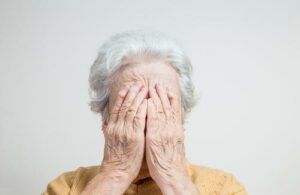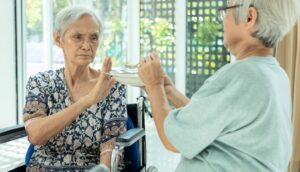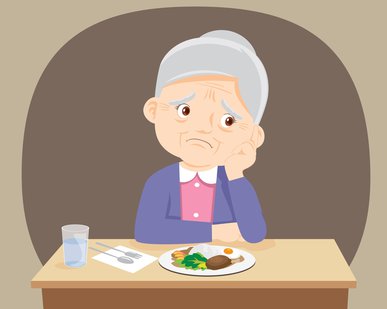Did you know that anorexia can affect people of all ages? It’s a misconception that this eating disorder is only seen in young adults. In fact, the elderly population is one of the most at-risk groups for developing anorexia. This is a serious problem, as anorexia can lead to a number of health complications in seniors. In this blog post, we will discuss the reality of anorexia in the elderly population and offer some advice on how to get help.
Contents
Understanding Anorexia In Elderly People
 Anorexia is a serious and often misunderstood condition, especially when it comes to the elderly population. Despite being commonly associated with young people, anorexia can affect anyone at any age, and older adults are actually one of the most vulnerable groups for developing this disorder.
Anorexia is a serious and often misunderstood condition, especially when it comes to the elderly population. Despite being commonly associated with young people, anorexia can affect anyone at any age, and older adults are actually one of the most vulnerable groups for developing this disorder.
The reality of anorexia among seniors is that it can be much more difficult to diagnose and treat, due to the unique physical, mental, and emotional factors that come into play. For example, many older adults struggle with issues like depression or anxiety that can make it harder for them to recognize their symptoms or seek help.
Can Elderly People Get Anorexia?
Yes, elderly people can get anorexia. The body undergoes many changes as we age, and these changes can sometimes trigger disordered eating behaviors in seniors.
In particular, older adults may struggle with weight loss due to a decline in physical activity or the natural slowing of their metabolism. This weight loss can then lead to feelings of shame and guilt, which can in turn trigger disordered eating behaviors like restricting food intake or over-exercising.
Furthermore, many older adults may also be dealing with other health conditions that can impact their ability to eat normally. For example, some seniors may be taking medication that interferes with their appetite or digestive system, while others may be dealing with chronic pain or other physical limitations that make it difficult to eat healthy foods and stay active.
So while the idea of anorexia in elderly people may seem surprising, the reality is that this disorder can affect anyone at any age. If you are concerned about a loved one who might be struggling with disordered eating behaviors.
What Causes Anorexia In the Elderly?
There are various causes of Anorexia in elderly people. These are as follows:
- First, many older adults may struggle with physical health issues that make it difficult to maintain a healthy weight. For example, they may be dealing with age-related conditions like osteoporosis or arthritis, which can limit their mobility and ability to exercise.
- Second, some elderly people may have underlying mental health issues such as depression or anxiety, which can lead to disordered eating behaviors.
- And finally, many older adults may be under a lot of stress or pressure in their lives, whether it’s from managing their health issues or caring for family members who are sick or elderly themselves. This can make them more vulnerable to developing an unhealthy relationship with food and body image.
Signs And Symptoms
There are various Signs and symptoms of anorexia in the elderly. It includes:
- Loss of appetite and drastic weight loss.
- Feeling cold, tired, or weak all the time.
- Dark circles under the eyes, brittle hair and nails, or dry skin.
- Frequent feelings of guilt or shame about eating habits.
These are just some of the many signs that someone may be suffering from anorexia in the elderly population. If you notice any of these symptoms in yourself or a loved one, it is important to seek help right away.
How To Deal With Anorexia In the elderly?

Anorexia is a serious condition that affects people of all ages, including the elderly. It can be challenging to deal with anorexia in older adults, as they may have unique needs and challenges that need to be addressed.
Proper care and support
One key thing to keep in mind when dealing with anorexia in the elderly population is to focus on providing them with the proper care and support. This may involve working closely with their doctors, family members, and other caregivers to develop a treatment plan that meets their individual needs.
Patience
One important thing to keep in mind when dealing with anorexia in older adults is to be patient and understanding. This can be a challenging condition to manage, so it is important to take things one step at a time and not get overwhelmed or discouraged.
Seek professional help
Another important factor to consider when dealing with anorexia in older adults is the importance of addressing any underlying mental health conditions or issues that may be contributing to disordered eating behaviors. This may involve working with a therapist or counselor to help the person develop healthier coping mechanisms and address any underlying issues that are causing them stress or anxiety.
Therapy and counseling
However, there are some strategies for managing anorexia in the elderly population that can be effective. For example, therapy and counseling are often very helpful in building a supportive network of caregivers and professionals who can help the individual work through their eating disorder.
Support groups
Additionally, support groups may also provide a valuable resource for elderly individuals struggling with anorexia. These groups allow them to connect with others facing similar challenges and gain valuable insights and advice from those who have been through similar situations.
Ultimately, it is crucial to remember that anorexia in elderly individuals can be treated and managed successfully with the right support and care. If you or someone you know is struggling with anorexia, it is important to seek professional help as soon as possible to get the support and treatment you need. With the right care and support, you can overcome this condition and regain your health and well-being. So don’t hesitate – to reach out today for help!
Self-care tips
for elderly people suffering from anorexia can be difficult, as many of the common strategies for managing and overcoming this eating disorder may not be effective or safe for elderly patients. For example, engaging in regular physical activity is often recommended to help maintain a healthy weight and promote feelings of well-being, but this may not be feasible or advisable for older adults with anorexia.
Diet and Nutrition
Another important consideration is diet and nutrition. Many older adults may be at risk of malnutrition due to poor eating habits or other medical conditions, so they must receive the proper nutrients to stay healthy and avoid further complications from anorexia.
At the end of the day, it is important to remember that overcoming anorexia at any age can be a challenging process. But with the right tools and resources, it is possible to achieve recovery and regain a healthy, balanced lifestyle. So if you or someone you love is struggling with anorexia, don’t hesitate to reach out for help. There are many supportive communities and resources available that can guide you along the way.
Conclusion
It may be concluded that anorexia in elderly individuals is a very serious and often overlooked condition that can have devastating consequences for those who suffer from it. . Furthermore, it can be difficult to accurately diagnose anorexia in this age group given their increased susceptibility to comorbid conditions, changes in appearance and weight loss, and social stigma. Despite these challenges, it is crucial that we better understand the unique factors that contribute to anorexia in senior citizens so that we can provide them with more effective treatment options and support. Only by doing this can we help elderly individuals reclaim their lives from this devastating condition.
For further information and suggestions, please contact Therapy Mantra. We have a team of expert therapists and psychiatrists that can help you overcome this problem. Get in touch with us right away to learn more about our services. You may also make an online therapy session or download our free Android or iOS app.


